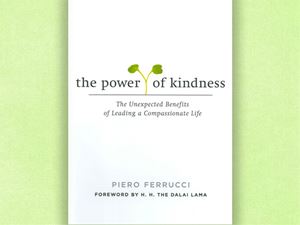
There is one human trait, above all others, that has allowed us to survive as a race. It permeates our familial relationships, prospers amongst our friendships, and even creates miracles amongst strangers. It takes us from simple survival to truly living.
That trait is kindness.
Psychotherapist, philosopher, and author, Piero Ferrucci, in his book, “The Power of Kindness,” warns against the perils of “global cooling”—the slow descent into an emotional freeze, precipitated by our increased reliance on impersonal modes of communication.
In other words, kindness is in danger. And, thus, so are we.
Kindness is not something we are obliged to indulge in. It can, in fact, can feel downright impractical.
Yet it is essential and life-changing. It is the boulder that falls into the river, forever diverting the water’s course. Kindness can permanently change lives—not only for the recipient, but for the one being kind. To be kind is to have a greater sense of physical, psychological, and spiritual wellbeing.
Kindness is the essential ingredient for a satisfying life.
Physical Wellbeing
Kindness is an intrinsic part of the human makeup, and when we are unkind, we suffer. Ferucci writes of the plethora of research that shows the health benefits of being good to others, saying that “If we are healthier when we are caring, empathetic, and open to others, it means we are born to be kind.”
Acting in unkind ways has the opposite effect. For a quick example of this, just think of the principle upon which a lie detector works. You’re hooked up to machinery which tests your stress response. Lying measurably stresses your body.
And just as lying causes stress by going against the brain’s default setting of truthfulness, so does unkindness cause it by going against our innate desire to help others.
They physical symptoms of stress are very real, affecting every part of the body from the brain, to the cardiovascular system, to the liver. Stress activates our “fight or flight” response, telling the central nervous system that we are under attack. The CNS then readies your body for action, releasing adrenaline and cortisol, which heighten awareness and aid in rapid response to threats.
But what if that “fight or flight” mode never gets turned off? What if, in addition to the rest of life’s difficulties—and, perhaps, because of them—we’re constantly being unkind to others, and stressing our bodies by doing so?
That kind of chronic stress leads to inflammation, which is a state wherein the body’s natural defenses interfere with otherwise healthy tissues. The results include headaches, fatigue, irritability, and sleeplessness, to name just a few.
Do your body a favor and don’t shy away from kindness. Be thoughtful and intentionally good to those around you, and you’ll be healthier for it.
Psychological Wellbeing
The evidence for the psychological effects of kindness is overwhelming.
In one study, published in the Journal of Social Psychology, researchers in Great Britain had participants fill out a survey which measured their life satisfaction. Dividing these participants into three groups, the researchers instructed the first set to perform a daily act of kindness, and the second set to perform something new each day. The third set received no instructions.
The two groups which practiced kindness and novel acts both experienced a significant increase in happiness, while the third group failed to grow happier at all.
When we help others, it causes the brain to release endorphins, according to psychologist Lara Honos-Webb, Ph.D. This creates a feeling similar to a runner’s high, leaving us feeling positive and energetic. It also raises serotonin in the brain, leading to feelings of well-being and satisfaction.
Kindness also creates “better relationships,” as Ferrucci writes. Nothing impacts our psychological wellbeing quite like our interactions with other people—if those interactions are fraught with tension and conflict, we’ll be unhappy. But if those interactions are full of the things we need—love, warmth, and trust—we’re much happier.
Don’t sacrifice your emotional and psychological wellbeing. Embrace kindness, and find peace.
The Path to Darkness
So if we’re wired for kindness, if it’s measurably good for us, why are we collectively experiencing, as Ferrucci puts it, an “Ice Age of the heart”?
The answer to this is threefold—we sacrifice our kindness at the altar of practicality, success, and fear.
We sacrifice kindness to practicality. We text rather than call because it’s faster. We develop automated systems, bereft of human touch and warmth, because it’s cheaper. We avoid reaching out to those in need, because we may just get taken advantage of.
We sacrifice kindness to success. We live in a culture that emphasizes winning at any cost, and so unkindness and success are often seen going hand-in-hand. We’ve convinced ourselves that one leads into the other, and so encourage Machiavellian behavior.
We sacrifice kindness, most of all, to fear. We use nastiness as a form of self-protection, armoring ourselves against emotional exposure by treating others unkindly. We become unpleasant because we’re unhappy with ourselves, taking out those frustrations and fears on others. It’s often simply too frightening to risk being open rather than looking inward and focusing solely on selfish concerns.
This is often what makes the world a scary place. This is why we have the capacity to be the “cruelest species on the planet,” as Ferrucci puts it. But this isn’t who we really are.
The Path to Kindness
“The Power of Kindness,” does so much more than merely outline the problem. Ferrucci suggests solutions, addressing topics such as empathy, honesty, loyalty, and many more.
But the core of taking those first steps along the path to kindness is to be willing to take a risk. Be brave. Becoming kind is frightening—it can feel like losing power, like being impractical or becoming a pushover.
But none of these fears are founded in anything solid. Most people will respond positively to your acts and words of kindness. And those few who do not, who try to take advantage of you? Don’t let them stop you—one kindness accomplished does more good than they can ever do harm to you.
Embrace kindness in an intentional way, bravely open yourself to its possibilities, and check out Ferrucci’s seminal work. Therein, you’ll learn how to grasp the most important ingredient for a life that is not only satisfying, but joyful.

